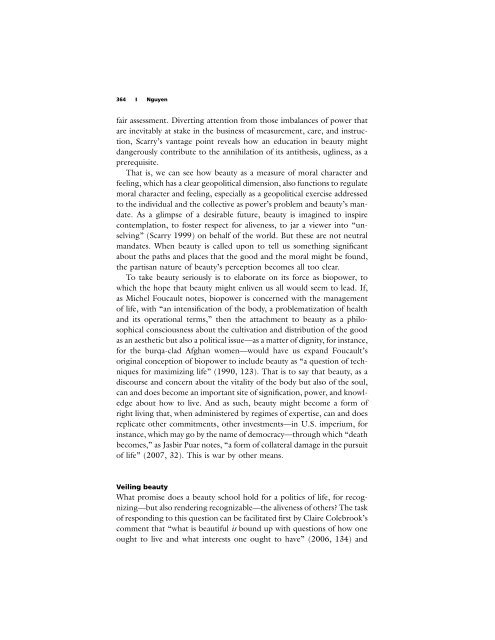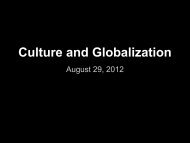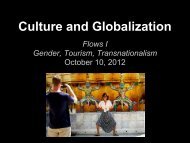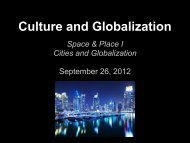Mimi Thi Nguyen, “The Biopower of Beauty: Humanitarian
Mimi Thi Nguyen, “The Biopower of Beauty: Humanitarian
Mimi Thi Nguyen, “The Biopower of Beauty: Humanitarian
You also want an ePaper? Increase the reach of your titles
YUMPU automatically turns print PDFs into web optimized ePapers that Google loves.
364 ❙ <strong>Nguyen</strong><br />
fair assessment. Diverting attention from those imbalances <strong>of</strong> power that<br />
are inevitably at stake in the business <strong>of</strong> measurement, care, and instruction,<br />
Scarry’s vantage point reveals how an education in beauty might<br />
dangerously contribute to the annihilation <strong>of</strong> its antithesis, ugliness, as a<br />
prerequisite.<br />
That is, we can see how beauty as a measure <strong>of</strong> moral character and<br />
feeling, which has a clear geopolitical dimension, also functions to regulate<br />
moral character and feeling, especially as a geopolitical exercise addressed<br />
to the individual and the collective as power’s problem and beauty’s mandate.<br />
As a glimpse <strong>of</strong> a desirable future, beauty is imagined to inspire<br />
contemplation, to foster respect for aliveness, to jar a viewer into “unselving”<br />
(Scarry 1999) on behalf <strong>of</strong> the world. But these are not neutral<br />
mandates. When beauty is called upon to tell us something significant<br />
about the paths and places that the good and the moral might be found,<br />
the partisan nature <strong>of</strong> beauty’s perception becomes all too clear.<br />
To take beauty seriously is to elaborate on its force as biopower, to<br />
which the hope that beauty might enliven us all would seem to lead. If,<br />
as Michel Foucault notes, biopower is concerned with the management<br />
<strong>of</strong> life, with “an intensification <strong>of</strong> the body, a problematization <strong>of</strong> health<br />
and its operational terms,” then the attachment to beauty as a philosophical<br />
consciousness about the cultivation and distribution <strong>of</strong> the good<br />
as an aesthetic but also a political issue—as a matter <strong>of</strong> dignity, for instance,<br />
for the burqa-clad Afghan women—would have us expand Foucault’s<br />
original conception <strong>of</strong> biopower to include beauty as “a question <strong>of</strong> techniques<br />
for maximizing life” (1990, 123). That is to say that beauty, as a<br />
discourse and concern about the vitality <strong>of</strong> the body but also <strong>of</strong> the soul,<br />
can and does become an important site <strong>of</strong> signification, power, and knowledge<br />
about how to live. And as such, beauty might become a form <strong>of</strong><br />
right living that, when administered by regimes <strong>of</strong> expertise, can and does<br />
replicate other commitments, other investments—in U.S. imperium, for<br />
instance, which may go by the name <strong>of</strong> democracy—through which “death<br />
becomes,” as Jasbir Puar notes, “a form <strong>of</strong> collateral damage in the pursuit<br />
<strong>of</strong> life” (2007, 32). <strong>Thi</strong>s is war by other means.<br />
Veiling beauty<br />
What promise does a beauty school hold for a politics <strong>of</strong> life, for recognizing—but<br />
also rendering recognizable—the aliveness <strong>of</strong> others? The task<br />
<strong>of</strong> responding to this question can be facilitated first by Claire Colebrook’s<br />
comment that “what is beautiful is bound up with questions <strong>of</strong> how one<br />
ought to live and what interests one ought to have” (2006, 134) and





